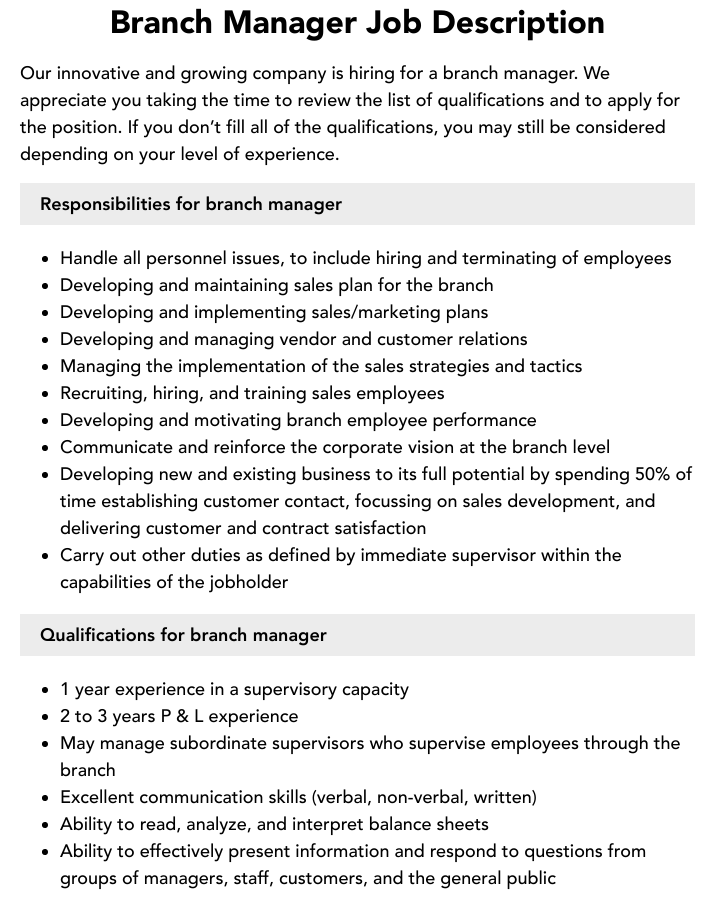
A branch director job description outlines the roles and responsibilities of a branch director, a senior-level manager responsible for overseeing the operations of a specific branch or location within a company. They are responsible for leading and motivating a team of employees, achieving financial targets, and ensuring the smooth operation of the branch. Branch directors typically have a deep understanding of the company’s products and services, as well as a strong track record in sales and management.
Branch directors play a vital role in the success of their respective branches and the company as a whole. They are responsible for developing and implementing strategies to grow the business, increase profitability, and improve customer satisfaction. They also play a key role in developing and mentoring staff, creating a positive and productive work environment, and ensuring that the branch operates in compliance with all applicable laws and regulations.
Branch director job descriptions typically include the following sections:
- Job title and summary
- Duties and responsibilities
- Qualifications and experience
- Compensation and benefits
1. Leadership
Leadership is a critical component of a branch director job description. Branch directors are responsible for leading and motivating their team of employees, setting the vision and direction for the branch, and creating a positive and productive work environment.
-
Facet 1: Vision and Mission
Branch directors must have a clear vision for the branch and be able to communicate this vision to their team. They must also be able to develop and implement a mission statement that aligns with the company’s overall goals. -
Facet 2: Communication
Branch directors must be effective communicators. They must be able to communicate their vision and mission to their team, as well as to customers and other stakeholders. They must also be able to listen to and understand the needs of their team and customers. -
Facet 3: Motivation
Branch directors must be able to motivate their team to achieve their goals. They must be able to create a positive and productive work environment, and provide their team with the resources and support they need to succeed. -
Facet 4: Decision-making
Branch directors must be able to make sound decisions quickly and efficiently. They must be able to weigh the pros and cons of different options and make decisions that are in the best interests of the branch and the company.
These are just a few of the key leadership qualities that branch directors must possess. By developing these qualities, branch directors can create a successful and productive branch that meets the needs of its customers and contributes to the overall success of the company.
2. Management
Management is a critical component of a branch director job description. Branch directors are responsible for the day-to-day management of the branch, including setting budgets, managing expenses, and ensuring that the branch operates in compliance with all applicable laws and regulations.
-
Facet 1: Financial Management
Branch directors must be able to manage the financial resources of the branch effectively. This includes setting budgets, tracking expenses, and forecasting financial performance. Branch directors must also be able to make sound financial decisions that are in the best interests of the branch and the company. -
Facet 2: Human Resource Management
Branch directors are responsible for the human resources of the branch, including hiring, training, and motivating employees. Branch directors must also be able to create a positive and productive work environment that encourages employee development and success. -
Facet 3: Operations Management
Branch directors are responsible for the day-to-day operations of the branch, including ensuring that the branch is clean and well-maintained, and that all equipment is in good working order. Branch directors must also be able to develop and implement operational procedures that improve efficiency and productivity. -
Facet 4: Compliance Management
Branch directors are responsible for ensuring that the branch operates in compliance with all applicable laws and regulations. This includes environmental regulations, health and safety regulations, and financial regulations. Branch directors must also be able to develop and implement compliance programs that help the branch to avoid legal problems.
These are just a few of the key management responsibilities that branch directors must fulfill. By developing these skills and knowledge, branch directors can ensure that their branch operates smoothly and efficiently, and that it meets the needs of its customers and the company.
3. Sales
Sales is a critical component of a branch director job description. Branch directors are responsible for growing the sales of their branch, developing and implementing sales strategies, and working with customers to meet their needs.
There are several reasons why sales is so important for branch directors. First, sales are the lifeblood of any business. Without sales, businesses cannot generate revenue and profit. Second, sales are essential for growing a business. By increasing sales, branch directors can increase the market share of their branch and the company as a whole. Third, sales are essential for building customer relationships. By working with customers to meet their needs, branch directors can build strong relationships that can lead to repeat business and referrals.
There are several key sales skills that branch directors need to possess. These skills include:
- Communication skills: Branch directors need to be able to communicate effectively with customers, employees, and other stakeholders. They need to be able to clearly and concisely explain the company’s products and services, and they need to be able to build rapport with customers.
- Negotiation skills: Branch directors need to be able to negotiate effectively with customers and other stakeholders. They need to be able to get the best possible deal for the company while also maintaining customer satisfaction.
- Sales closing skills: Branch directors need to be able to close sales effectively. They need to be able to persuade customers to buy the company’s products or services, and they need to be able to overcome objections.
By developing these sales skills, branch directors can increase the sales of their branch and contribute to the overall success of the company.
4. Operations
Operations is a critical component of a branch director job description. Branch directors are responsible for the day-to-day operations of the branch, including ensuring that the branch is clean and well-maintained, and that all equipment is in good working order.
-
Facet 1: Facilities Management
Branch directors are responsible for the upkeep and maintenance of the branch facilities. This includes ensuring that the branch is clean and well-maintained, and that all equipment is in good working order. Branch directors must also be able to develop and implement procedures for the maintenance and repair of the branch facilities. -
Facet 2: Inventory Management
Branch directors are responsible for the management of the branch’s inventory. This includes ensuring that the branch has sufficient inventory to meet customer demand, and that the inventory is properly stored and accounted for. Branch directors must also be able to develop and implement procedures for the ordering and tracking of inventory. -
Facet 3: Customer Service
Branch directors are responsible for ensuring that customers receive high-quality service. This includes providing customers with accurate information about the company’s products and services, and resolving customer complaints quickly and efficiently. Branch directors must also be able to develop and implement procedures for providing excellent customer service. -
Facet 4: Compliance Management
Branch directors are responsible for ensuring that the branch operates in compliance with all applicable laws and regulations. This includes environmental regulations, health and safety regulations, and financial regulations. Branch directors must also be able to develop and implement procedures for ensuring compliance with all applicable laws and regulations.
These are just a few of the key operations responsibilities that branch directors must fulfill. By developing these skills and knowledge, branch directors can ensure that their branch operates smoothly and efficiently, and that it meets the needs of its customers and the company.
Branch Director Job Description FAQs
This section addresses frequently asked questions regarding branch director job descriptions, providing concise and informative answers.
Question 1: What are the primary responsibilities of a branch director?
A branch director is accountable for leading, managing, and overseeing a branch’s operations. They direct a team, implement sales strategies, and ensure compliance with company policies and regulations.
Question 2: What qualifications are typically sought for branch director roles?
Typically, branch director positions require a bachelor’s degree in business administration, finance, or a related field. Several years of experience in a managerial role, particularly in the financial services industry, are often sought.
Question 3: What are the key skills and attributes of an effective branch director?
Effective branch directors possess strong leadership, communication, problem-solving, and decision-making habilidades. They demonstrate expertise in financial management, sales, and operations, and maintain a customer-centric approach.
Question 4: What are the typical job duties of a branch director?
Branch directors typically oversee branch operations, set goals, manage staff, develop sales strategies, and ensure adherence to regulatory guidelines. They also represent the company at industry events and menjalin hubungan with key stakeholders.
Question 5: What is the career path for branch directors?
Branch directors may advance to regional or national leadership roles within the financial services industry. They may also pursue opportunities in other industries, leveraging their management and financial expertise.
Question 6: What is the salary range for branch directors?
Branch director salaries vary based on experience, location, and company size. According to industry benchmarks, the average salary range for branch directors in the United States is between $70,000 and $120,000 annually.
This concludes our exploration of frequently asked questions regarding branch director job descriptions. We have covered various aspects of the role, including responsibilities, qualifications, skills, duties, career progression, and salary expectations.
Transitioning to the next article section:
For further insights into branch director job descriptions, refer to the comprehensive sections in this document, which provide a detailed examination of the role’s key components.
Branch Director Job Description Tips
To excel in a branch director role, it is essential to possess not only the necessary qualifications and skills, but also a strategic mindset and a commitment to continuous growth. Here are some valuable tips to consider:
Tip 1: Enhance Communication Skills
Effective communication is paramount for branch directors. They must be able to articulate their vision, motivate their team, and build rapport with customers. Active listening, clear speech, and the ability to adapt communication styles are crucial.Tip 2: Foster a Positive and Inclusive Work Environment
Branch directors set the tone for their team’s culture. They should prioritize creating a work environment that values diversity, collaboration, and open communication. By empowering employees and fostering a sense of belonging, they can enhance productivity and job satisfaction.Tip 3: Stay Abreast of Industry Trends
The financial services industry is constantly evolving. Branch directors must stay updated on the latest regulations, market trends, and technological advancements. Attending industry events, reading relevant publications, and engaging in professional development opportunities are essential for staying competitive.Tip 4: Focus on Customer Satisfaction
Customers are the lifeblood of any financial institution. Branch directors should prioritize building strong customer relationships by understanding their needs, resolving issues promptly, and delivering exceptional service. A customer-centric approach can lead to increased customer loyalty and positive word-of-mouth.Tip 5: Embrace Technology and Innovation
Technology plays a vital role in the financial services industry. Branch directors should embrace new technologies and digital tools to improve efficiency, enhance customer experiences, and streamline operations. By leveraging data and analytics, they can make informed decisions and optimize branch performance.Tip 6: Seek Mentorship and Professional Development
Continuous learning and professional development are essential for branch directors. Seeking mentorship from experienced leaders can provide invaluable insights and guidance. Attending workshops, conferences, and certification programs can enhance knowledge and skills, leading to career advancement.Tip 7: Set Clear Goals and Objectives
Establishing clear goals and objectives is crucial for branch directors. These goals should align with the overall strategic direction of the organization and be specific, measurable, achievable, relevant, and time-bound. Regular performance reviews can help track progress and make necessary adjustments.Tip 8: Foster a Results-Oriented Culture
Branch directors should promote a culture of accountability and performance. Setting clear expectations, providing regular feedback, and recognizing and rewarding success can motivate employees to achieve desired outcomes. Celebrating team achievements and milestones can also boost morale and encourage a results-driven mindset.
By incorporating these tips into their approach, branch directors can enhance their leadership capabilities, drive branch success, and contribute to the overall growth and profitability of their organization.
In conclusion, a branch director job description encompasses a wide range of responsibilities and requires a unique combination of skills and qualities. By embracing these tips and continuously seeking opportunities for improvement, individuals can excel in this challenging and rewarding role.


